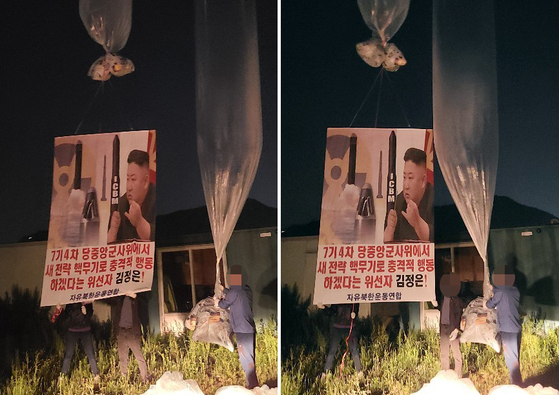The stage of the battle surrounding the Anti-North Korean War Prohibition Act (revised Inter-Korean Relations Development Act) promulgated on the 29th of last month is showing signs of expanding beyond the domestic market to the United States. Six members of the National Assembly’s Foreign Transportation Day Committee (Song Young-gil, Kim Young-ho, Kim Young-ho, Jeong Jin-seok, Park Jin, and Kim Seok-ki) are preparing to visit the United States on the 19th to 24th without resolving the confrontation between the two. Although the National Assembly’s Foreign Communications Commission’s visit to the US is in terms of diplomatic relations to the US Congress and Joe Biden’s administration, which is scheduled to be launched, concerns are raised that different messages from the opposition parties surrounding the leaflet law could rather lead to diplomatic confusion.
The leaflet law contains penalties for sending all kinds of leaflets and other items containing external information, including USB (removable storage device), to North Korea. In the visit to the US, the Democratic Party’s lawmakers are expected to emphasize the position that the leaflet law is inevitable to protect the safety of residents in border areas such as the Military Demarcation Line (MDL). A Democratic Party member of the Foreign Communications Commission said, “We plan to explain in detail the Korean specificity, such as the anxiety experienced by residents in the border region due to the warfare against North Korea, and the background of the law passing the National Assembly in a military confrontation with North Korea.”
野 Senator Smith and’video conference’
On the other hand, members of the People’s Strength plan to promote the injustice by emphasizing the fact that the shear method has an unconstitutional character that restricts freedom of expression. Prior to their visit to the US, members of the People’s Power joined the US House of Representatives Chris Smith, who announced that a hearing on the leaflet law was “worried about democracy and human rights damage”. Rep. Ji Seong-ho said, “We have decided to discuss with Rep. Chris Smith on the 6th, starting with a video conference in the form of a meeting, from the hearing schedule to the main agenda.” “Finally, the US House of Representatives condemned the anti-North Korea warfare law. “I will work with Congressman Smith until the resolution is announced.”

In May of last year, the Free North Korean Movement Association, a North Korean defector group, sent 500,000 flyers to North Korea in Seongdong-ri, Wolgot-ri, Gimpo-si. yunhap news
On the 4th, Rep. Tae Young-ho, a former North Korean refugee diplomat, distributed a policy report to all fellow lawmakers pointing out the unconstitutionality of the leaflet law. “The Moon Jae-in regime is too easily restricting freedom of expression, a constitutional value that supports democracy,” said Rep. Tae. “The legislative purpose of the government is not for the lives and safety of the people in the border region, but for dialogue with North Korea. I have a reasonable doubt that it will be.”
The message of’shearing law’ divided between the opposition parties
The problem is that disparate ruling and opposition lawmakers sending different messages to the United States could further accelerate concerns in the international community over the shear law. In particular, in the position of Joe Biden’s administration, which is preparing to launch, he faces the’two Koreas’ surrounding the shear law. Professor Shin Seong-ho of the Graduate School of International Studies at Seoul National University said, “It is a natural political process to exchange different opinions between the opposition parties in Korea, but it is a completely different thing to bring different messages to the United States and cause confusion.” It can be seen that both parties and parties are visiting the United States and trying to do it.”
Concerns are also raised about the ruling Democratic Party and the government’s intention to stop the Tom Lantos Human Rights Committee’s hearing on leaflet law. At the same time, an attempt to prevent the holding of a hearing could be a diplomatic rude and at the same time an act of self-defeating. Jeong-Geon Seo, Professor of Political Science and Diplomacy at Kyunghee University, said, “If you object to the purpose of the hearing, you can communicate your position through witnesses attending the hearing. Attempts to intervene in the hearing itself are a tremendous irrational number and an act that can turn a diplomatic rude “I pointed out.
Reporter Jeong Jin-woo [email protected]
